Margaret Cheung Receives NSF Grant Renewal
 Margaret Cheung, associate professor of physics, received a five-year renewal of her
project, “Effects of Cellular Environment on Protein Structure and Folding Dynamics.”
The total award is $678,294.
Margaret Cheung, associate professor of physics, received a five-year renewal of her
project, “Effects of Cellular Environment on Protein Structure and Folding Dynamics.”
The total award is $678,294.
The project, funded by the National Science Foundation, is jointly supported by Molecular Biophysics in the Division of Molecular and Cellular Biosciences in the Directorate for Biological Sciences and the Computational Physics Program in the Division of Physics in the Mathematical and Physical Sciences Directorate.
Cheung's group will study the effects of the cellular environment on the structure and folding dynamics of proteins and will train students in this area of research.
The research includes three integrated directions:
- Application of computer simulations to quantify folding kinetics in the presence of chemical denaturants and crowded media and relate these results to similar in vitro experiments. This will allow the investigation of transition-state structures and possible movements of the transition states of protein folding in cell-like media, which can then inform the design of further in vitro experiments.
- Development of a quantitative description between energy landscape profiles and protein-folding kinetics in crowded environments, which is essential to better understand the underlying physical principles behind computer simulations and in vitro experimental data.
- Combination of computer simulations, development of improved theories, and collaboration with experimentalists to advance the knowledge of how competing cellular effects, such as macromolecular crowding, electrostatics, and hydrodynamic interactions, tune the structures and folding kinetics of proteins in cells.